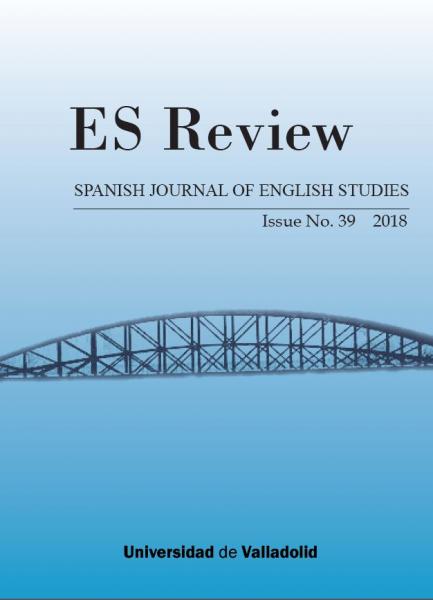|
Jonathan P. A. Sell
Cecil Gerahty’s The Road to Madrid: An Anglo-Irish Falstaff in Spain’s Theatre of War
|
11-28
|
|
Teresa Gibert
|
29-50
|
|
Miguel Sebastián Martín
|
51-67
|
|
Mayron Estefan Cantillo Lucuara
|
69-96
|
|
Carmen María Fernández Rodríguez
Blackness and Identity in Sarah Harriet Burney’s Geraldine Fauconberg (1808) and Traits of Nature (1812)
|
97-115
|
|
Laura Gimeno Pahissa
“WE NEED CHARACTER!”: Remembering Alexander Crummell’s Appeal to Postbellum African Americans
|
117-133
|
|
Pilar Sánchez Calle
Writing, Aging and Death in Margaret Atwood’s The Door
|
135-156
|
|
Carmen Laguarta Bueno
The Plight of Not Belonging: Jean Rhys’s “Let Them Call It Jazz” and “The Day They Burned the Books”
|
157-172 |
|
Carmen Escobedo de Tapia
Searching for an Environmental Identity: Hullabaloo in the Guava Orchard (1996) by Kiran Desai
|
173-192
|
|
Bárbara Arizti Martín
Of Holes and Wounds: Postcolonial Trauma and the Gothic in Catherine Jinks’s The Road |
193-214
|
|
Laura de la Parra Fernández
Subversive Wanderings in the City of Love: Constructing the Female Body in Jean Rhys’s Good Morning, Midnight
|
215-232 |
|
Aída Díaz Bild
|
233-254 |
|
Leonor María Martínez Serrano
The Audible Light of Words: Mark Strand on Poetry and the Self |
255-280 |
|
María Mercedes Soto Melgar
Loanwords in the Living Speech of the Fishermen of Cadiz: The Case of Anglicisms |
281-302 |
|
Burcu Gülüm Tekin
Book Review: Gillian M. E. Alban. The Medusa Gaze in Contemporary Women’s Fiction: Petrifying, Maternal and Redemptive
|
303-305 |
|
Christopher Rollason
Boor Review: Emron Esplin. Borges’s Poe: The Influence and Reinvention of Edgar Allan Poe in Spanish America |
307-311 |
|
María Jesús Lorenzo Modia
Boor Review: Marisol Morales-Ladrón, editor. Family and Dysfunction in Contemporary Irish Narrative and Film |
313-317 |
|
Sarah M. Abas
M. G. Sanchez: An Interview |
319-330 |



